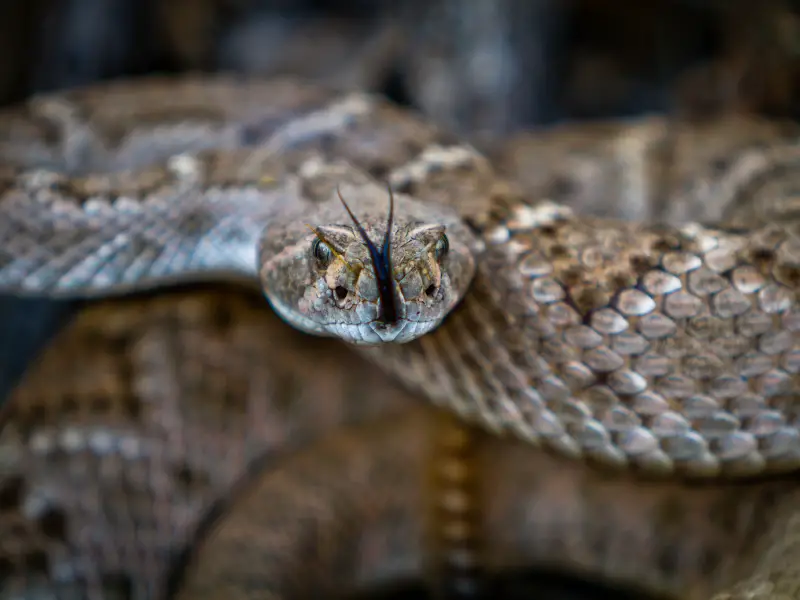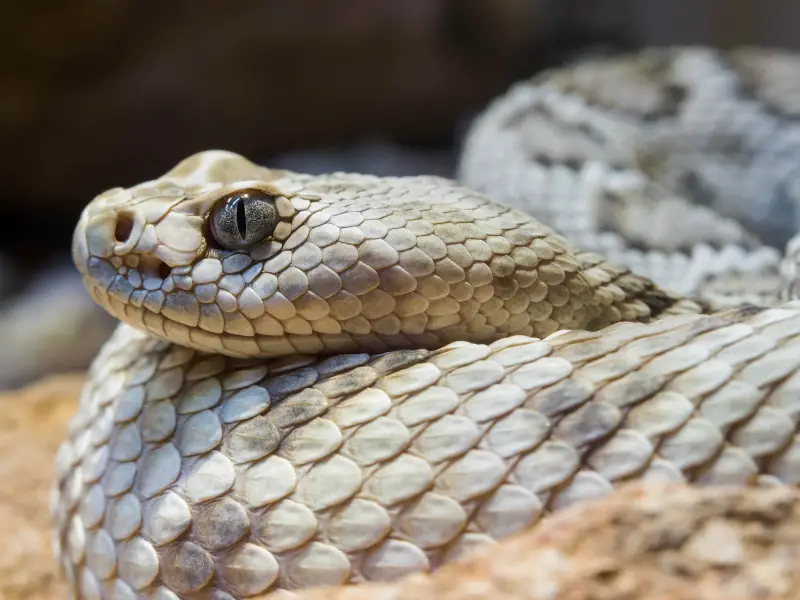Rabbits are known for their agility and quick reflexes, which help them evade predators in the wild. One predator that poses a significant threat to rabbits is the rattlesnake. Rattlesnakes are venomous and can cause serious harm to their prey. This raises the question: are rabbits immune to rattlesnake venom?
Studies have shown that rabbits have a higher tolerance for rattlesnake venom compared to other animals. This is due to a protein in their blood called crotaline, which helps neutralize the venom. However, rabbits are not completely immune to rattlesnake bites and can still suffer from the effects of the venom.
Despite their tolerance for rattlesnake venom, it is important to note that rabbits should not be purposely exposed to these snakes. Rattlesnake bites can still be fatal to rabbits and should be avoided at all costs. It is crucial for rabbit owners to take preventative measures to keep their pets safe from potential predators in their environment.
Are Rabbits Immune to Poison?
Rabbits are known for their ability to survive in the wild, despite facing numerous predators. One of the most dangerous of these predators is the rattlesnake, which is known for its venomous bite. Many people believe that rabbits are immune to rattlesnake venom, but is this really true?
While it is true that rabbits have a natural resistance to some types of poison, such as those found in certain plants, they are not immune to rattlesnake venom. In fact, rabbits are one of the most common prey items for rattlesnakes in the wild.
Rattlesnake venom contains a complex mixture of proteins and enzymes that can cause a wide range of symptoms in animals that are bitten. These symptoms can include pain, swelling, tissue damage, and even death in some cases.
While rabbits may have some natural defenses against venom, such as a faster metabolism and the ability to produce certain enzymes that can break down toxins, these defenses are not enough to protect them from the effects of rattlesnake venom.
In conclusion, while rabbits may have some natural resistance to certain types of poison, they are not immune to rattlesnake venom. It is important to take precautions to protect your pet rabbit from potential predators, including rattlesnakes, by keeping them in a secure enclosure and monitoring their interactions with other animals in the area.
How are rabbits immune to snake venom?

Rabbits are known for their ability to resist the effects of snake venom. This is due to a combination of factors that work together to provide protection against venom.
One of the key factors is the presence of specialized enzymes in the rabbit’s liver that are capable of breaking down the toxins found in snake venom. These enzymes are able to neutralize the venom before it has a chance to cause harm to the rabbit’s body.
In addition to these enzymes, rabbits also have a unique immune system that is able to recognize and respond to the specific proteins found in snake venom. This immune response helps to prevent the venom from spreading throughout the rabbit’s body and causing damage to vital organs.
Another factor that contributes to the rabbit’s immunity to snake venom is their ability to quickly clot their blood. This rapid clotting response helps to prevent the venom from spreading throughout the body and causing widespread damage.
Overall, the combination of these factors provides rabbits with a high degree of protection against snake venom, allowing them to survive even when bitten by highly venomous snakes.
How do we know if our rabbit is immune to snake venom?
It is difficult to determine whether a rabbit is immune to snake venom without conducting extensive testing. However, there are some factors that can indicate whether a rabbit may have a higher resistance to snake venom.
One factor is the rabbit’s geographic location. Rabbits that live in areas with a higher prevalence of venomous snakes may have developed some level of immunity over time. This is because exposure to snake venom can stimulate the production of antibodies that can neutralize the venom.
Another factor is the rabbit’s diet. Rabbits that consume a diet rich in plants that contain natural toxins may have a higher resistance to snake venom. This is because natural toxins in plants can stimulate the immune system and increase the production of antibodies.
If a rabbit has been bitten by a snake and survives, it may indicate that the rabbit has some level of immunity to snake venom. However, it is important to note that surviving a snake bite does not necessarily mean that the rabbit is completely immune to snake venom.
Overall, it is important to take precautions to protect rabbits from snake bites, such as keeping them in enclosed areas and removing any potential snake habitats from their environment. If a rabbit is bitten by a snake, it is important to seek veterinary care immediately.
How does rabbit immunity for snake venom work?
Rabbits are known to be immune to rattlesnake venom, which has puzzled scientists for a long time. However, recent studies have shed light on the mechanisms behind this unique immunity.
When a rattlesnake bites a rabbit, the venom is injected into the rabbit’s bloodstream. The venom contains a variety of toxic proteins that can cause tissue damage, paralysis, and even death. However, rabbits have evolved a set of physiological and immunological adaptations that allow them to neutralize the venom before it can cause harm.
One of the key mechanisms behind rabbit immunity is the presence of antibodies that specifically target snake venom proteins. These antibodies are produced by B cells in the rabbit’s immune system and can recognize and bind to venom proteins with high affinity. Once bound, the antibodies can prevent the venom from interacting with cells and tissues in the body, effectively neutralizing its toxic effects.
Another important adaptation is the presence of enzymes in the rabbit’s liver that can break down and metabolize snake venom proteins. These enzymes, known as esterases, can cleave the venom proteins into smaller, less toxic fragments that can be excreted from the body.
Finally, rabbits have a unique blood clotting system that can prevent the spread of venom throughout the body. When a rattlesnake bites a rabbit, the venom can cause blood to clot and block blood vessels, leading to tissue damage and death. However, rabbits have evolved a set of clotting factors that can counteract the venom’s effects and prevent excessive clotting.
Overall, rabbit immunity to snake venom is a fascinating example of the coevolution between predators and prey. While rattlesnakes have evolved potent venom to subdue their prey, rabbits have evolved a suite of adaptations that allow them to survive and thrive in the face of this threat.
Can a Rabbit Beat a Snake?
When it comes to the question of whether rabbits are immune to rattlesnake venom, the answer is not a straightforward one. While it is true that rabbits have some natural defenses against snake venom, they are not completely immune to it.
Rabbits have a few different strategies for avoiding snake bites. For example, they have excellent hearing and can detect the sound of a rattlesnake’s rattle from a considerable distance away. They also have a keen sense of smell and can detect the scent of a snake in the area.
If a rabbit does encounter a snake, it may try to avoid it altogether. However, if it is cornered or feels threatened, it may resort to other tactics. One of these tactics is to try to kick the snake with its powerful hind legs. Another is to use its sharp teeth to bite the snake.
While these tactics can be effective in some cases, they are not foolproof. If a rabbit is bitten by a venomous snake, it can still be seriously injured or killed. In fact, rabbits are one of the most common prey items for many species of venomous snakes.
Overall, while rabbits do have some natural defenses against snake venom, they are not immune to it. If you are a rabbit owner, it is important to take steps to protect your pet from snakes, such as keeping them in a secure enclosure and removing any potential hiding spots for snakes in their environment.
Conclusion
In conclusion, rabbits are not immune to rattlesnake venom. While rabbits are known for their ability to survive snake bites, this is not due to immunity to the venom. Rather, it is due to their ability to quickly metabolize and eliminate the venom from their bodies.
Studies have shown that rabbits injected with rattlesnake venom will experience symptoms such as swelling, pain, and tissue damage. Without proper treatment, these symptoms can lead to serious complications and even death.
It is important for rabbit owners to take precautions to prevent encounters with rattlesnakes, such as keeping their rabbits in secure enclosures and removing potential hiding spots for snakes. In the event of a snake bite, prompt veterinary care is essential to ensure the best possible outcome for the rabbit.
While rabbits may have some natural defenses against snake bites, it is important to remember that they are not immune to the effects of venom. By taking proactive measures to prevent encounters with snakes and seeking prompt veterinary care when necessary, rabbit owners can help ensure the health and safety of their pets.
Related Articles:

